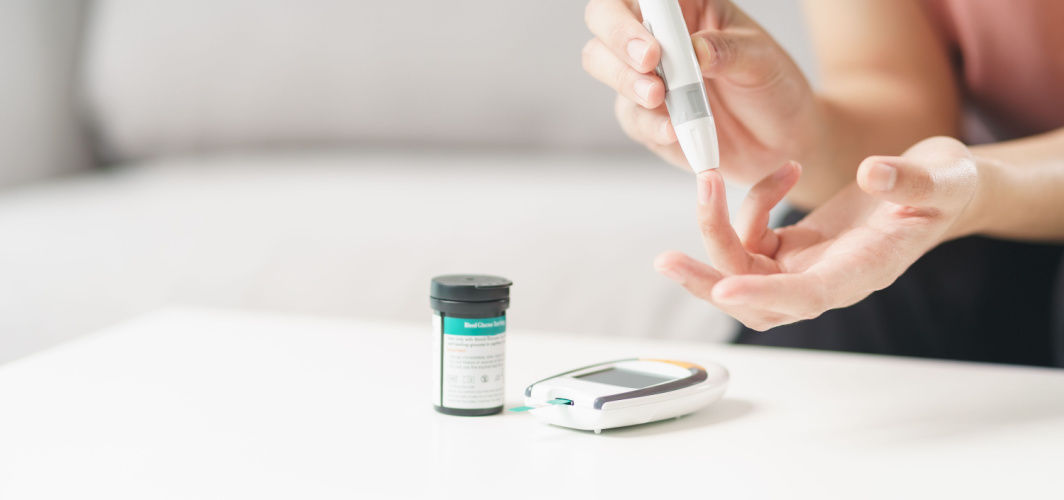Diabetes Management
Why Should Diabetics Regularly Monitor Their Blood Glucose?
4 min read
By Apollo 24|7, Published on - 13 March 2023, Updated on - 12 December 2023
Share this article
0
0 like

Monitoring blood sugar levels periodically is one of the most essential aspects of managing both type 1 and type 2 diabetes. This practice enables you to identify the food or lifestyle-related triggers that may cause your blood sugar levels to rise or drop significantly. Using this information, your doctor can create the best possible diabetes care plan for you. In most cases, the doctors educate the patients on how often they need to check their glucose levels. This is where diabetic monitors and blood sugar meters come in handy. These monitors allow the patients to record their blood sugar levels at all times. Here are other benefits of using diabetic monitors.
Benefits Of Using A Diabetic Monitor
Following are some of the major benefits of using a diabetic monitor:
1. Monitoring your blood sugar levels help you figure out whether or not you are meeting your glucose targets. This can help avoid long-term diabetes-related complications and keep the unpleasant symptoms of low and high blood sugar at bay. This information helps you determine the best way of managing your diabetes on a day-to-day basis.
2. For diabetics, monitoring their blood sugar levels is vital to determine just how well their existing treatment plan is working and whether or not it needs any modification. The information gathered by using a diabetic monitor can help your doctor formulate the best treatment plan for you. These decisions can prove to be extremely helpful in delaying or preventing diabetes complications like stroke, heart attack, blindness, kidney disease, and even amputation.
3. Diabetes affects every individual in a different way. So, there’s no one right approach for diabetes management for everyone. Monitoring your glucose level will help you gain a better understanding of what works for you and what doesn’t, such as taking your medicine or insulin at different times, exercising and eating different foods.
How To Use A Diabetic Monitor?
There are primarily two ways for diabetics to monitor their blood sugar levels at home. These include:
1. Glucometer and finger stick
The most common and widely used blood sugar monitoring method involves the use of a glucometer and test strips. Also referred to as a finger stick check, this method requires you to prick your finger with a needle (called a lancet) to release a drop of blood. Then, you need to place this blood drop on the test strip, placed in the glucometer, which shows you the blood sugar levels within a few seconds. The limitation of this method is that it only gives you information about your blood sugar at a specific moment. So, diabetics may have to check their blood glucose many times during the day.
2. Continuous Glucose Monitor (CGM)
This method of blood sugar monitoring requires diabetics to wear a device that keeps a check on their glucose levels at all times. A CGM uses this data to create a graph displaying the complete picture of how your sugar levels vary over time. Most of these devices use a tiny sensor, which is inserted under your skin. This sensor measures your glucose levels 24 hours a day. There are many different brands and types of CGMs, some of which are linked to specific insulin pumps while others work independently. Most of these devices can send alerts or alarms when high or low blood sugar levels are detected.
Explore Continuous Glucose Monitor
You can choose either one or even both methods as per your needs.
Conclusion
The frequency of blood sugar monitoring can vary from person to person. However, every diabetic should keep an eye on their blood sugar levels to prevent any complications. So, all you need to do is to just follow the instructions given by your doctor and maintain a healthy lifestyle. If you need more information,
Consult Apollo's Expert Diabetologists
You can also try the Apollo 24|7 Diabetes Self-Management Tool to log your sugar values, track patterns, know all about food nutrition and more.
Medically reviewed by Dr Sonia Bhatt.
Diabetes Management
Consult Top Diabetologists
View AllLeave Comment
Recommended for you
.jpg?tr=q-80)
Diabetes Management
Preventing Diabetes Onset: The Importance of Prediabetes Monitoring
Prediabetes is a condition characterised by slightly elevated blood sugar levels. If not controlled or reversed to normal levels, it can potentially progress to type 2 diabetes. Regularly monitoring blood glucose levels allows for early detection, aids in understanding individual responses to lifestyle factors, and empowers people to make informed decisions about their diet and exercise routines, improving their health.

Diabetes Management
Understanding Prediabetes and Metabolic Syndrome: The Common Ground
Prediabetes and metabolic syndrome are common conditions affecting many Indians today. While they might seem distinct, they often overlap and share many risk factors. Understanding these conditions, their connection, the importance of regular physical activity, a balanced diet, maintaining a healthy weight and how to manage them can go a long way in preventing serious health complications such as diabetes or heart disease.

Diabetes Management
Can One Develop Diabetes at a Young Age?
Diabetes can develop at a young age, not just in older adults. Type 1 diabetes, autoimmune and diagnosed in childhood or adolescence, contrasts with Type 2, more common in young people, linked to obesity and lifestyle. Risk factors: family history, obesity, sedentary behavior, poor diet, puberty hormones. Prevention involves lifestyle, check-ups, family support, and education. Diabetes affects all ages, including teenagers and children.
Subscribe
Sign up for our free Health Library Daily Newsletter
Get doctor-approved health tips, news, and more.
Visual Stories

8 Fruits That are Incredibly Healthy for Diabetes
Tap to continue exploring
Recommended for you
.jpg?tr=q-80)
Diabetes Management
Preventing Diabetes Onset: The Importance of Prediabetes Monitoring
Prediabetes is a condition characterised by slightly elevated blood sugar levels. If not controlled or reversed to normal levels, it can potentially progress to type 2 diabetes. Regularly monitoring blood glucose levels allows for early detection, aids in understanding individual responses to lifestyle factors, and empowers people to make informed decisions about their diet and exercise routines, improving their health.

Diabetes Management
Understanding Prediabetes and Metabolic Syndrome: The Common Ground
Prediabetes and metabolic syndrome are common conditions affecting many Indians today. While they might seem distinct, they often overlap and share many risk factors. Understanding these conditions, their connection, the importance of regular physical activity, a balanced diet, maintaining a healthy weight and how to manage them can go a long way in preventing serious health complications such as diabetes or heart disease.

Diabetes Management
Can One Develop Diabetes at a Young Age?
Diabetes can develop at a young age, not just in older adults. Type 1 diabetes, autoimmune and diagnosed in childhood or adolescence, contrasts with Type 2, more common in young people, linked to obesity and lifestyle. Risk factors: family history, obesity, sedentary behavior, poor diet, puberty hormones. Prevention involves lifestyle, check-ups, family support, and education. Diabetes affects all ages, including teenagers and children.

